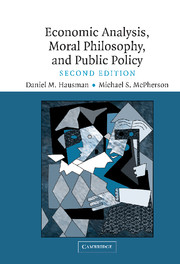II - WELFARE AND CONSEQUENCES
Published online by Cambridge University Press: 06 July 2010
Summary
Economic outcomes may be better or worse along several dimensions. Some may make people better-off. Other outcomes may show more respect for human dignity, and still others may permit greater freedom. To decide which dimensions are more important requires moral judgment.
As illustrated by Larry Summers's memorandum (discussed in Chapter 2), economists evaluate outcomes in terms of individual welfare. One outcome is better than another if and only if the first makes people better off than the second. Since the evaluation of outcomes rests exclusively on their consequences for individual welfare, the theory of individual welfare is crucial to normative economics. Indeed, normative economics is often called “welfare economics.” As we saw in Chapter 5, economists take welfare to be the satisfaction of preferences.
Economists evaluate institutions and policies as well as outcomes. In principle, institutions and policies might be evaluated in many ways; for example, markets might be valued because of the freedoms they involve regardless of whether they promote individual well-being. But in fact economists assess institutions and policies in terms of their welfare consequences. So, for instance, economists typically value freedoms for their contribution to welfare. Economists focus on only one of the many evaluative questions they could ask about economic institutions, policies, and outcomes: “How well do they satisfy preferences?”
Part II focuses on welfarism – the evaluation of outcomes, institutions, actions, and policies in terms of their effect on individual welfare. Chapter 7 discusses utilitarianism, which ties assessment to total or average well-being.
- Type
- Chapter
- Information
- Economic Analysis, Moral Philosophy and Public Policy , pp. 97 - 98Publisher: Cambridge University PressPrint publication year: 2006



